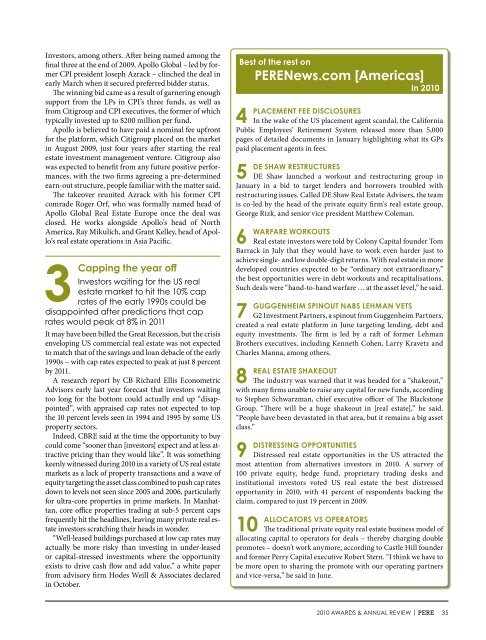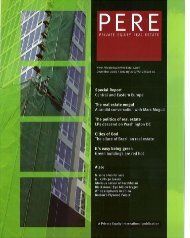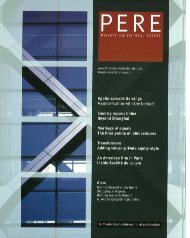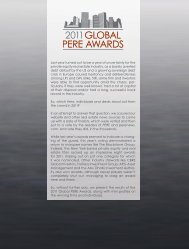2010AWARDS & AnnuAL REVIEW - PERE
2010AWARDS & AnnuAL REVIEW - PERE
2010AWARDS & AnnuAL REVIEW - PERE
Create successful ePaper yourself
Turn your PDF publications into a flip-book with our unique Google optimized e-Paper software.
Investors, among others. After being named among the<br />
final three at the end of 2009, Apollo Global – led by former<br />
CPI president Joseph Azrack – clinched the deal in<br />
early March when it secured preferred bidder status.<br />
The winning bid came as a result of garnering enough<br />
support from the LPs in CPI’s three funds, as well as<br />
from Citigroup and CPI executives, the former of which<br />
typically invested up to $200 million per fund.<br />
Apollo is believed to have paid a nominal fee upfront<br />
for the platform, which Citigroup placed on the market<br />
in August 2009, just four years after starting the real<br />
estate investment management venture. Citigroup also<br />
was expected to benefit from any future positive performances,<br />
with the two firms agreeing a pre-determined<br />
earn-out structure, people familiar with the matter said.<br />
The takeover reunited Azrack with his former CPI<br />
comrade Roger Orf, who was formally named head of<br />
Apollo Global Real Estate Europe once the deal was<br />
closed. He works alongside Apollo’s head of North<br />
America, Ray Mikulich, and Grant Kelley, head of Apollo’s<br />
real estate operations in Asia Pacific.<br />
3Capping the year off<br />
investors waiting for the us real<br />
estate market to hit the 10% cap<br />
rates of the early 1990s could be<br />
disappointed after predictions that cap<br />
rates would peak at 8% in 2011<br />
It may have been billed the Great Recession, but the crisis<br />
enveloping US commercial real estate was not expected<br />
to match that of the savings and loan debacle of the early<br />
1990s – with cap rates expected to peak at just 8 percent<br />
by 2011.<br />
A research report by CB Richard Ellis Econometric<br />
Advisors early last year forecast that investors waiting<br />
too long for the bottom could actually end up “disappointed”,<br />
with appraised cap rates not expected to top<br />
the 10 percent levels seen in 1994 and 1995 by some US<br />
property sectors.<br />
Indeed, CBRE said at the time the opportunity to buy<br />
could come “sooner than [investors] expect and at less attractive<br />
pricing than they would like”. It was something<br />
keenly witnessed during 2010 in a variety of US real estate<br />
markets as a lack of property transactions and a wave of<br />
equity targeting the asset class combined to push cap rates<br />
down to levels not seen since 2005 and 2006, particularly<br />
for ultra-core properties in prime markets. In Manhattan,<br />
core office properties trading at sub-5 percent caps<br />
frequently hit the headlines, leaving many private real estate<br />
investors scratching their heads in wonder.<br />
“Well-leased buildings purchased at low cap rates may<br />
actually be more risky than investing in under-leased<br />
or capital-stressed investments where the opportunity<br />
exists to drive cash flow and add value,” a white paper<br />
from advisory firm Hodes Weill & Associates declared<br />
in October.<br />
Best of the rest on<br />
<strong>PERE</strong>news.com [Americas]<br />
in 2010<br />
4<br />
PLACEMEnT FEE DISCLOSuRES<br />
In the wake of the US placement agent scandal, the California<br />
Public Employees’ Retirement System released more than 5,000<br />
pages of detailed documents in January highlighting what its GPs<br />
paid placement agents in fees.<br />
5<br />
DE SHAW RESTRuCTuRES<br />
DE Shaw launched a workout and restructuring group in<br />
January in a bid to target lenders and borrowers troubled with<br />
restructuring issues. Called DE Shaw Real Estate Advisers, the team<br />
is co-led by the head of the private equity firm’s real estate group,<br />
George Rizk, and senior vice president Matthew Coleman.<br />
6<br />
WARFARE WORKOuTS<br />
Real estate investors were told by Colony Capital founder Tom<br />
Barrack in July that they would have to work even harder just to<br />
achieve single- and low double-digit returns. With real estate in more<br />
developed countries expected to be “ordinary not extraordinary,”<br />
the best opportunities were in debt workouts and recapitalisations.<br />
Such deals were “hand-to-hand warfare … at the asset level,” he said.<br />
7<br />
GuGGEnHEIM SPInOuT nABS LEHMAn VETS<br />
G2 Investment Partners, a spinout from Guggenheim Partners,<br />
created a real estate platform in June targeting lending, debt and<br />
equity investments. The firm is led by a raft of former Lehman<br />
Brothers executives, including Kenneth Cohen, Larry Kravetz and<br />
Charles Manna, among others.<br />
8<br />
REAL ESTATE SHAKEOuT<br />
The industry was warned that it was headed for a “shakeout,”<br />
with many firms unable to raise any capital for new funds, according<br />
to Stephen Schwarzman, chief executive officer of The Blackstone<br />
Group. “There will be a huge shakeout in [real estate],” he said.<br />
“People have been devastated in that area, but it remains a big asset<br />
class.”<br />
9<br />
DISTRESSInG OPPORTunITIES<br />
Distressed real estate opportunities in the US attracted the<br />
most attention from alternatives investors in 2010. A survey of<br />
100 private equity, hedge fund, proprietary trading desks and<br />
institutional investors voted US real estate the best distressed<br />
opportunity in 2010, with 41 percent of respondents backing the<br />
claim, compared to just 19 percent in 2009.<br />
10<br />
ALLOCATORS VS OPERATORS<br />
The traditional private equity real estate business model of<br />
allocating capital to operators for deals – thereby charging double<br />
promotes – doesn’t work anymore, according to Castle Hill founder<br />
and former Perry Capital executive Robert Stern. “I think we have to<br />
be more open to sharing the promote with our operating partners<br />
and vice-versa,” he said in June.<br />
2010 AwArds & AnnuAl review | <strong>PERE</strong> 35







